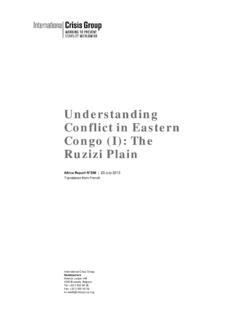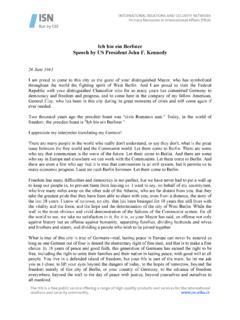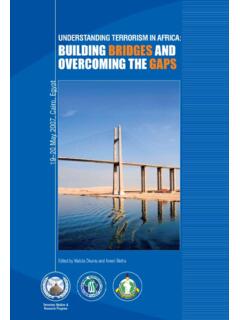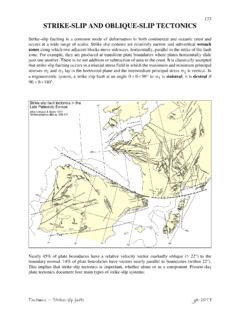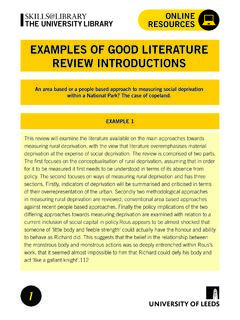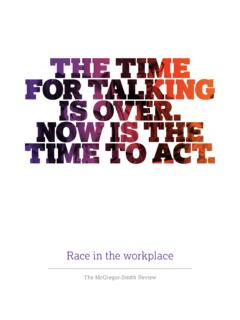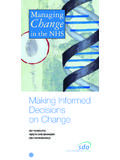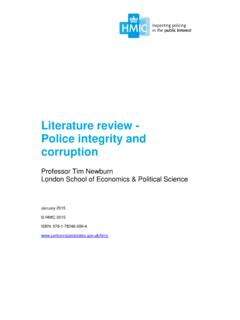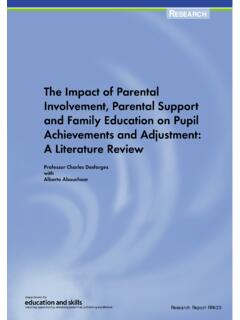Transcription of The Policy Process - ETH Z
1 1 Working Paper 118 THE Policy Process :AN OVERVIEWR ebecca SuttonAugust 1999 Overseas Development InstitutePortland HouseStag PlaceLondon SW1E 5DP2 The research on which this work is based was funded by the World Bank, and completed under theguidance of Simon Maxwell, Director, Overseas Development Institute. Any questions should bedirected to him (email Responsibility is the author author would like to acknowledge the work of James Keeley and Ian Scoones, Institute ofDevelopment Studies, University of by Chameleon Press Ltd, London SW18 4 SGISBN 0 85003 417 5 Overseas Development Institute 1999 All rights reserved. No part of this publication may be reproduced, stored in a retrieval system, or transmitted in anyform or by any means, electronic, mechanical, photocopying, recording or otherwise, without prior written permissionof the Linear Ideas from Five Political International Relations15 dichotomy between Policy -making and management of change The role of interest groups in the Policy of the Policy Process urge to narrowing of Policy makes policies happen31 Bibliography3345 SummaryThe paper offers an introduction to analysis of the Policy Process .)
2 It identifies and describestheoretical approaches in political science, sociology, anthropology, international relations andmanagement. It then reviews five cross-cutting themes: (a) the dichotomy between Policy -makingand implementation; (b) the management of change; (c) the role of interest groups in the policyprocess; (d) ownership of the Policy Process ; and (e) the narrowing of Policy alternatives. The paperconcludes with a 21-point check-list of what makes Policy happen . A glossary of key terms is key argument of the paper is that a linear model of Policy -making, characterised by objectiveanalysis of options and separation of Policy from implementation, is inadequate. Instead, Policy andpolicy implementation are best understood as a chaos of purposes and accidents.
3 A combination ofconcepts and tools from different disciplines can be deployed to put some order into the chaos,including Policy narratives, Policy communities, discourse analysis, regime theory, changemanagement, and the role of street-level bureaucrats in agentAn individual who sees change as an opportunity rather than a threat, who will be instrumental inmanaging change and taking it forward. The individual will give direction and momentum to theimplementation of new policies and methods. Bridger (see Ambrose 1989) first developed the discourseA development discourse describes a way of thinking and outlook, a system of values and prioritiesthat marginalises other possible ways of thinking. A discourse is a configuration of ideas whichprovides the threads from which ideologies are woven.
4 Numerous discourses can be identified, forexample the scientific discourse , which sees development as a rational, technical and scientificprocess, grounded in Western analysisThere are two meanings for this term depending on how discourse is defined: When used to mean a particular way of thinking and arguing which involves the politicalactivity of naming and classifying (as above), discourse analysis attempts to make explicit theimplicit values and ideologies in discourses. It aims to depoliticise them and strip them of theirvalue-laden terminology. Discourse can also refer to dialogue, language, and conversation. If defined in this way,discourse analysis relates to the analysis of language used in Policy -making.
5 It relates, forexample, to the use of labelling in Policy discussions, such as peasants , the rural poor , or landless .Epistemic/ Policy communityA group of technical experts who have access to privileged information and share and discuss do not have access to this information and are excluded. Individuals can be from theresearch community, NGOs, international organisations or a range of other organisations. Epistemiccommunities can have powerful influences on Policy -making, some expressing certain politicalopinions and having links with governmental hatchesA term developed by Clay and Schaffer (1984) describing the way Policy makers avoidresponsibility for policies they make. Clay and Schaffer pinpoint the dichotomy between Policy -making and implementation (see section three) as an avenue which can be used to this end.
6 Forexample, Policy makers who see implementation as a separate Process to Policy -making, may blamea poor Policy outcome on inadequate political will or lack of sufficient resources in theimplementation phase, rather than poor escape hatches include the way policies may be termed in a style and language whichimplies the Policy being pursued is obviously the only practical one or clearly the best option . Ifa particular Policy direction is apparently so obvious, it seems that everyone would make the samedecision in the circumstances, and responsibility is therefore taken away from the Policy analysisA term from management literature to conceptualise the forces interacting to oppose and supportchange. These forces act in opposition to each other to create a state of equilibrium in a happens when the balance point of the equilibrium shifts.
7 For this to happen there needs tobe substantial alteration to one or more of the restraining or driving forces which maintain RegimeA set of principles, norms, rules, and procedures accepted by states, which help them to realisecommon interests. Regimes are institutions with explicit rules, agreed upon by governments thatpertain to sets of issues in international relations. The concept explains how states, each acting inself-interest, can come together to work towards some basic common interests in the absence of aregulating authority, such as a global government , which forces them to do narrativeA story , having a beginning, middle and end, outlining a specific course of events which hasgained the status of conventional wisdom within the development arena.
8 The tragedy of thecommons is a Policy narrative, for example, which outlines the series of events leading fromovergrazing of common land by pastoralists to eventual desertification. The wood fuel crisis inAfrica is another. Despite evidence which calls into question the validity of many narratives, theypersist widely because they simplify complex development processes. They are an attempt to bringorder to the complex multitude of interactions and processes which characterise developmentsituations. Policy makers often base Policy decisions on the stories outlined in narratives are distinct from discourses, which refer to a wider set of values and a way ofthinking. A narrative can be part of a discourse if it describes a specific story which is in line withthe broader set of values and priorities of a network/coalitionA group of individuals and organisations who share similar belief systems, codes of conduct andestablished patterns of behaviour.
9 There is much debate about the distinction between policynetworks and epistemic/ Policy communities in the political science literature : In one definition (Rhodes, quoted in Atkinson and Coleman 1992), a Policy community isdefined as a stable, tightly-knit group of relationships, with more restrictive membership andgreater insulation from other institutions than a Policy network. In this definition, a policynetwork is a broader system of relationships, which are less stable and less restrictive. A policy8community can therefore be seen as a subset of a Policy network. In a second definition (Wilks and Wright, Coleman and Skogstad, quoted in Atkinson andColeman 1992), Policy communities are broader, a group of actors who share an interest in thesame Policy area and succeed in influencing Policy over time.
10 In this definition a Policy networkrefers to the system of relationships that links the community first definition will be used in this paper. Policy networks are often the mechanisms throughwhich narratives and discourses develop and are space/ room for manoeuvreThe room within which a Policy maker has to manoeuvre relates to the extent to which a policymaker is restricted in decision making by forces such as the opinions of a dominant epistemiccommunity or narrative. If there are strong pressures to adopt a particular strategy a decision makermay not have much room to consider a wider set of options. There may be times, on the other hand,when an individual has a substantial amount of leverage over the Process , able to assert his or herown preferences and mould the way Policy choices are considered fairly technologyFirst introduced by Foucault, this term relates to the way Policy is often depoliticized , if suchdepoliticization is in the interest of dominant group.

